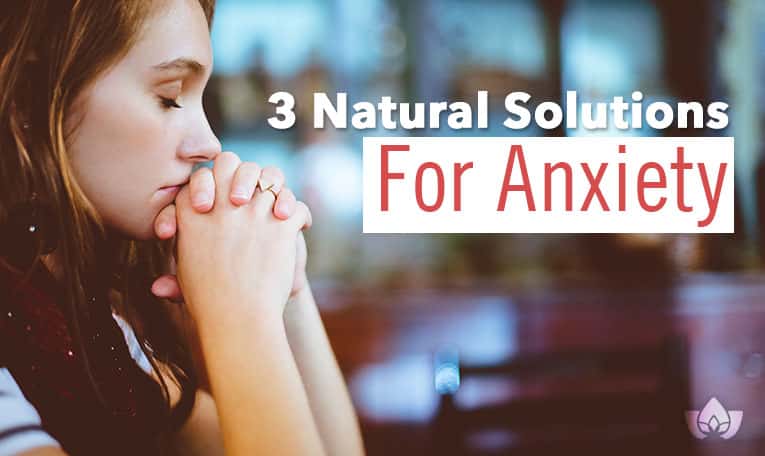
Do you have anxiety and don’t know how to deal with it?
Anxiety is a common issue in the modern world.
I would know; as a naturopathic doctor I’ve seen a number of patients over the years who suffer from anxiety.
It’s normal to experience occasional anxiety when confronted with various situations.
However, if it persists for a long time it could be an indication that you may have anxiety disorder.
According to Statistics Canada, one in four Canadians – that’s more than nine million people – will deal with some sort of anxiety disorder at some point in their lives.
While this issue is easy to identify, it’s surprisingly hard for many people to deal with.
The good news is, I can help.
The Mindful Healing Clinic is a naturopathic clinic that offers natural solutions for anxiety to help you regain control of your life.
While pharmaceutical options can be helpful, naturopathic solutions can help manage and reduce your anxiety symptoms.
They can also help address certain contributing risk factors through lifestyle changes.
Before we get into that though, let’s get a better understanding of what anxiety is.
What Is Anxiety
Feelings of anxiety are as common as feelings of sadness, happiness, or frustration.
It’s how your body was designed to cope with a stressful situation.
If you’ve ever given a talk in front of a group of people, interviewed for a job, or faced an unfamiliar situation, you’re likely familiar with feelings of anxiety.
It’s perfectly normal to feel these feelings and does not necessarily indicate any underlying health issues.
However, a bout of particularly intense anxiety that lasts for longer than six months may be a sign that you have anxiety disorder.
This type of anxiety often doesn’t seem to be about anything in particular, and it may also interfere with the day to day activities in your life.
RELATED: Naturopathic Solutions For Stress
An anxiety disorder may manifest itself in a number of different ways.
Let’s take a closer look at the various ways in which you can experience anxiety.
Panic Disorder
Panic disorder is a condition where you feel episodes of sudden intense terror or fear.
These feelings often come up quickly and without warning, often in response to a specific trigger.
These panic attacks may cause you to have feelings of impending doom, as well as physical symptoms such as:
-
- Shortness of breath
- Chest pain
- Heart palpitations
- Sweating
- Trembling
Having a panic attack may lead you to worry about experiencing one again, and may cause you to avoid situations in which they’ve happened.
Phobias
A phobia is an excessive irrational fear of a certain thing, scenario, or event.
Different from a rational fear, like the general aversion you’d feel to a swarm of wasps flying toward you, phobias are often a fear based response to an otherwise benign scenario.
It’s possible for some people to experience panic attacks due to their phobias.
Post-Traumatic Stress Disorder (PTSD)
PTSD is a form of anxiety that’s related to a traumatic event in your past.
If you’ve experienced or witnessed a particularly horrific event in your past, certain triggers can cause you to relive that event.
This is particularly common with military veterans adjusting to civilian life and refugees fleeing a war torn part of the world.
PTSD can cause you to experience severe anxiety, uncontrollable thoughts about your traumatic incident, flashbacks, and nightmares.
Obsessive Compulsive Disorder (OCD)
OCD is a disorder that drives you to perform a set of specific, familiar tasks, usually as a result of intrusive and frightening thoughts.
These thoughts may be memories of past trauma or occur with no apparent reason or source.
This can manifest itself in obsessive checking (for example, making sure your doors and windows are locked over and over out of fear that someone will break in).
It may also present itself through hoarding, or compulsive hand-washing, or an obsession with cleanliness.
The repetitive symptoms of OCD can be time consuming and significantly interfere with your daily life.
Separation Anxiety
Separation anxiety is the fear of being away from a certain person or group of people, or location.
It often develops in childhood but can affect adults as well.
Social Anxiety Disorder
Social anxiety disorder is an intense fear of unfamiliar social situations.
It’s usually combined with feelings of self consciousness, embarrassment, and a fear of being judged by others.
It can impact your life by causing you to avoid social situations that may trigger these negative feelings.
Hypochondria
Hypochondria is a specific form of anxiety related to your health.
It involves the fear that you have a serious illness.
These days, it’s referred to as “somatic symptom disorder” or “illness anxiety disorder”.
What Causes Anxiety Disorders?
Although the full causes behind anxiety disorders are not yet understood, there are several known risk factors which can contribute to your anxiety disorder or make it worse.
These include:
-
-
- Having a family history of anxiety
- Stress buildup
- Being a woman – women are twice as likely as men to develop an anxiety disorder
- Exposure to particularly intense or prolonged traumatic events
- A history of abuse, especially in childhood
- Poor diet and excessive sugar intake
- Issues with serotonin production
- Hormone imbalances – commonly linked to your thyroid
-
RELATED: Common Signs Of Stress (And What To Do About Them)
In some people, anxiety can also be associated with an underlying health issue, such as:
-
-
- Respiratory disorders
- Drug misuse or withdrawal
- Thyroid disorders – particularly hypothyroidism
-
Natural Solutions For Anxiety
Experiencing anxiety can cause you significant distress and negatively impact your daily life.
Fortunately, there are a number of natural solutions that can help you cope with anxiety.
Let’s take a look at a few of them.
1. Avoid Processed Foods
A 2016 study by Aucoin and Bhardwaj found that foods high in sugar and carbohydrates can contribute to feelings of anxiety, nervousness, and fatigue.
Processed foods like cookies, pastries, soft drinks, fast food, and packaged sugary cereals all fall into this category.
These foods are generally not the healthiest for you in the first place for many other reasons as well, so it’s a good idea overall to avoid them.
RELATED: 5 More Amazingly Unhealthy Foods To Avoid
2. Eat More Whole Foods
On the flip side of the coin, eating a high-quality diet made up mostly of whole foods can help reduce feelings of anxiety.
Mood swings, chronic fatigue, and insomnia are often linked with a poor diet as well as high or low blood sugar levels.
Because these symptoms are often linked with anxiety, improving your diet can make a difference here.
Whole foods include things like:
-
-
- Fruit
- Vegetables
- Meats
- Eggs
- Yogurt
- Nuts
- Seeds
- Beans
- Oils
-
And of course, it goes without saying that the organic, un-processed versions of these are the better options.
3. Reduce Alcohol, Caffeine, And Tobacco
Caffeine, tobacco, and alcohol don’t seem to cause anxiety disorders, but if you already have one, these substances are likely to make it worse.
They can increase your likelihood of triggering and experiencing symptoms of anxiety.
As a naturopathic doctor, it’s my job to tell you that the ideal consumption of these substances is zero.
But of course, nobody’s perfect.
If you are going to drink, try to limit your alcohol consumption to no more than three drinks per week and your caffeine intake to no more than one cup of coffee per day.
Book Your Appointment With The Mindful Healing Clinic Today
Have you been struggling with anxiety and are looking for ways to help deal with it?
If so, contact me, Dr. Maria Cavallazzi, ND, to book an appointment here at the Mindful Healing Clinic.
The above solutions are just some of the many natural solutions for anxiety.
We’ll work together to uncover the root causes of your anxiety disorder and put together a treatment plan designed to help you better manage these feelings and live a less anxious life.
Book your appointment with The Mindful Healing Clinic today.
Until next time,
Dr. Maria Cavallazzi, N.D
Mindful Healing Naturopathic Clinic
Mississauga, ON L5M 1L7
(905) 819-8200
► https://g.page/MindfulClinicNaturopathic
Dr. Maria Cavallazzi is a medical doctor from Colombia where she practiced as a family physician for 8 years until she moved to Canada 16 years ago and became a naturopathic doctor in Mississauga.



